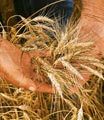Nearly half the wheat cultivated in developing countries is grown under resource-poor, rainfed conditions.
 Some of the poorest and most disadvantaged wheat farmers live in areas with less than 350 mm annual rainfall and their livelihoods often depend solely on income from wheat production. Moreover, in these areas wheat is a staple food, providing around half the daily caloric requirement, and also constitutes an important source of fodder for livestock.
Some of the poorest and most disadvantaged wheat farmers live in areas with less than 350 mm annual rainfall and their livelihoods often depend solely on income from wheat production. Moreover, in these areas wheat is a staple food, providing around half the daily caloric requirement, and also constitutes an important source of fodder for livestock.
The growing scarcity of water in irrigated areas is increasing the pressure to apply and use water more effectively, as well as driving the need for water-efficient germplasm. CIMMYT will enhance its focus on the development of wheat germplasm with enhanced input use efficiency.
Water use efficiency (or drought tolerance) is a highly complex trait genetically, but CIMMYT is well positioned to address this issue. Effective conservation agriculture practices will further enhance the value of water use efficient wheat cultivars. Finally, suitable grain quality is an increasingly important requirement for farmers who move beyond subsistence farming to surplus-based farming. CIMMYT will work with partners, applying its considerable experience in assessing and improving industrial quality and other key quality traits.